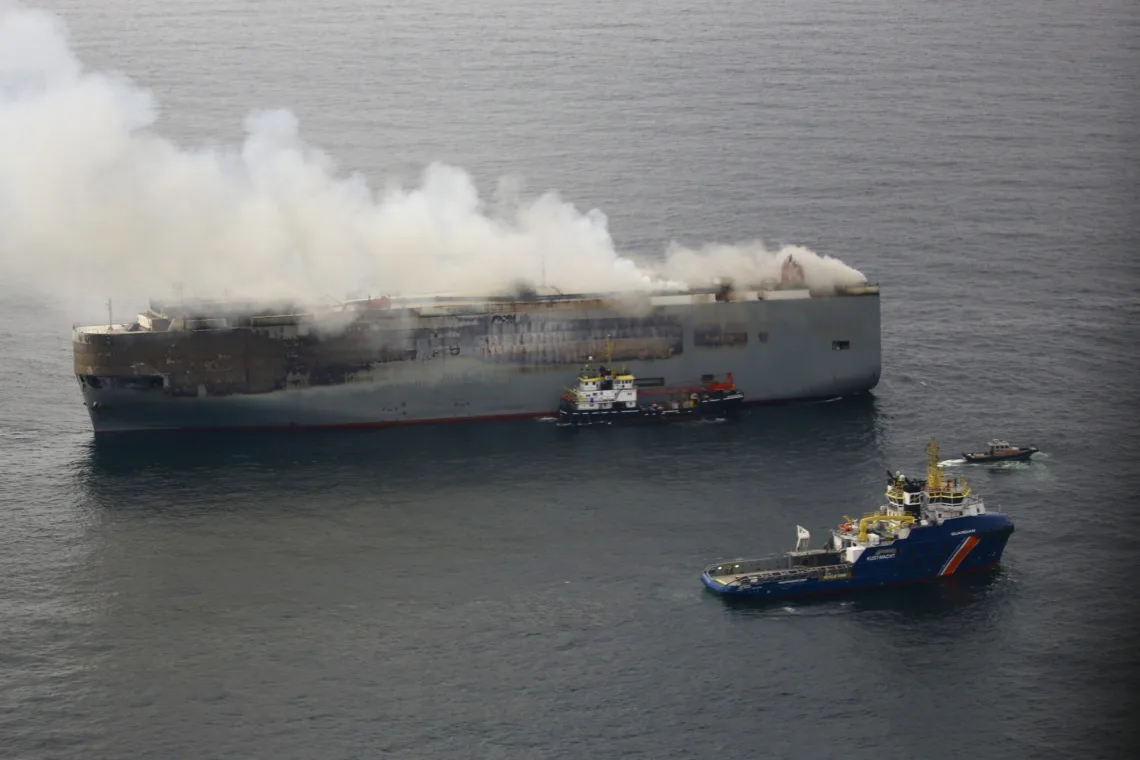On Saturday night, the towing of the burning ro-ro ship Fremantle Highway had to be postponed due to wind conditions blowing toxic smoke over the tugboat and its crew. New information shows that the cargo consisted of 3783 new cars, of which 498 are electric cars, which explains the difficulties in extinguishing the fire.
Due to the current southwest wind, it is not possible to tow the ship at the moment. The smoke development from the fire and the current wind direction cause the smoke to drift over the tugboat throughout the entire towing operation of the ship. So if the salvage company starts the towing now, this is not without risk, and the safety and health of the crew always come first. The wind will continue to blow from the southwest in the coming days. The towing of Fremantle Highway to its new temporary location can therefore still take several days before it continues. (Rijkswaterstaat)
https://twitter.com/Rijkswaterstaat/status/1685376818491064320?s=20
New information
Fremantle Highway left Bremerhaven on the afternoon of Tuesday, July 25, with Port Said as the next port. During the night to Wednesday, off the Dutch island of Ameland, a violent fire broke out. The entire crew of 23 had to jump into the sea. One sailor died, and several of the survivors suffered fractures.
On Wednesday morning, it was reported that the fire had started in an electric car.
This has not yet been finally confirmed, but after several days of back and forth, it is now known that the ship was on its way to Singapore with 3783 new cars, including 498 electric cars, far more than what was originally reported.
https://twitter.com/Reuters/status/1685384700624556032?s=20
Electric cars a danger to shipping
Electric cars pose a danger at sea, it’s not just the Norwegian Coastal Route Havila that has discovered this. According to Deutsche Welle, the International Maritime Organization (IMO) is now working to update the regulations for the transport of electric cars at sea.
Deutsche Welle also brings numbers from the insurance company Allianz which show that there were 209 ship fires reported in 2022, an increase of 17 percent from 2021. 13 of these fires occurred on ro-ro ships (car ferries), and although it is not known how many of these fires involved electric cars, the spotlight is now on batteries.
The lithium-ion batteries installed in these vehicles are extremely difficult to extinguish when they start to burn. The fire cannot be extinguished with water or by lack of oxygen, as this poses a risk of explosion. Not only that, thermal processes can also cause fires to spontaneously reignite. Burning batteries must be extinguished with special substances that are often not supplied on ships like Fremantle Highway. (Deutsche Welle)
Deutsche Welle continues:
It is clear from the precautions taken on commercial flights that this [lithium batteries, translator’s note] can be a serious problem. Passengers on airplanes are not allowed to check-in laptops in suitcases but must bring their computers with them into the cabin as hand luggage. If a device gets warm or starts to smoke, passengers are advised to alert the crew immediately, which is now explicitly mentioned before each start. There are strict regulations for air freight as well. Only certain types of batteries can be transported on airplanes, and then only under strict conditions with regard to packaging, for example. (Deutsche Welle)
The danger of an environmental disaster has also not been ruled out. According to information from the German Environmental Protection Department, there were 1600 tons of heavy oil and 200 tons of marine diesel on board Fremantle Highway. In addition, comes what might be in the fuel tanks of the fossil cars.
Q&A: Fire on board the Fremantle Highway ship (Deutsche Welle)

